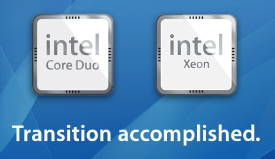Mac OS X Leopard release to set off wave of hardware upgrades


Unlike the fizzle that PC users showed for the launch of Windows Vista, the Mac faithful will be out in force, standing in line to be the first on the block to run the new software. Some sites expect the release on Friday, Oct. 26, although a Halloween introduction might be more fun. Or perhaps Mac users will combine the events and dress in their costumes over the weekend.
However, will Apple execs during next week's analyst call note the many PowerPC-based Macs that are sure candidates for Intel replacements over the next year?
At a recent BMUGWest Mac user group meeting I attended in San Francisco, many users there are still running Power Macs and PowerBooks. Some said they are mulling upgrades.
Half the machines that I run in my home office are G4 based. No doubt, I will upgrade some of them this year.
Still, many Mac users will first buy the software update. It's just a biennial tradition of the Mac community. And Leopard will run just fine on these PowerPC machines. Certainly, developers (as well as Apple shareholders) are pleased that Apple extended Leopard compatibility to so many machines in the installed base.
At the same time, pros working on PowerPC G5 workstations as well as owners of PowerPC G4 machines will find they want a greater level of performance. This isn't because of some deficit with Leopard. Developers say Apple is giving users who expect top-notch performance — meaning Mac users who author or edit content (or in other words, most Mac users) — new reasons to move up to new equipment.
I spoke recently about this hardware upgrade cycle with a video software developer who declined attribution. He said Apple was pulling back on specific optimizations in its software applications for PowerPC Macs. As an example, he pointed to Final Cut Studio 2, Apple's professional video editing package.
"Apple spent very little time optimizing the new codecs that came with Final Cut Pro for PowerPC. They said 'if you want best performance, you've got to get a new machine and we're only going to spend our time optimizing for MacBook Pros and Mac Pros and that's it.' People with older machines will lag farther and farther behind."
In a similar vein, this summer at its WWDC (Worldwide Developers Conference), Apple sent a power and performance message to developers that Carbon, the still widely-used set of APIs that helped transition classic Mac code to OS X, is coming to the end of its lifecycle.
I remember back in 1998, Steve Jobs said to developers at WWDC that "all life forms will be based on Carbon." No longer. So, without a 32-bit workaround, Leopard won't support Carbon's 64-bit user interface elements. Developers of performance-hungry 64-bit professional content and technical applications must move away from Carbon.
The video developer said he had only recently upgraded to a MacBook Pro and hadn't thought that the change would make a difference on his productivity. But he was surprised to find that it did — the difference was "night-and-day in terms of speed of the machine."
"Now that you can pack 4GB [of RAM] on a laptop, this means that you can do things that would have been ridiculously slow even on a G5 tower machine," he said.
He ran down a list of many power-hungry programs that he was now running concurrently. "That would have been ridiculous even on a [PowerPC] G5 machine."
In addition, he said Intel's compiler tools for Mac OS X also make a significant difference in speed. He reported a 30 to 40 percent performance gain in some applications "just by recompiling and nothing else. "
For the Windows world, the Vista installed base has come from new computer sales. Now, Microsoft is having to offer Windows XP to customers again. But for its OS transition, Apple will see a different situation.
Starting soon, most Mac users will upgrade to Leopard; and over the next year, many longtime customers will also decide that it's time to finally join the Intel generation with a new machine purchase. So, Apple will get double benefit from its upgrade strategy.